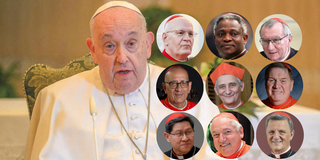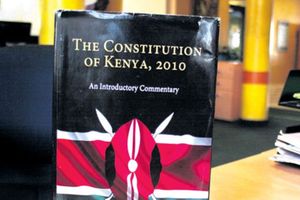
The likely successors of Pope Francis: Cardinal Peter Erdo (Top left), Cardinal Peter Kodwo Appiah, Cardinal Pietro Parolin, (Middle row from left), Cardinal Juan Jose Omella, Archbishop of Bologna Matteo Maria Zuppi, Cardinal Joseph Tobin. (Bottom row) Cardinal Luis Antonio Gokim Tagle, Jean-Marc Aveline, archbishop of Marseille and Cardinal Mario Grech.
Pope Francis, the Argentine Jesuit, died on April 21, aged 88, cementing his legacy as the most progressive Catholic pontiff of the modern era.
He opened the church’s gates, welcoming divorced Catholics back into communion, authorising blessings for same-sex couples (Fiducia Supplicans), and amplifying marginalised voices through the Synod on Synodality—a global consultative process launched in 2021 to foster greater dialogue, participation and collaboration within the church.
His was a papacy that ventured beyond the marbled stillness of Vatican corridors. He was a fervent champion of climate justice, migrants and the forgotten poor. He also challenged the church’s patriarchal instincts, nudging women closer to full inclusion, stopping well short of ordination.
Now, the conclave—the cloistered gathering of cardinals tasked with electing a new pope—faces a moment of historic potential: choosing the first African pope since Gelasius I (492–496 AD), a North African Berber.
Vatican praise
Among the frontrunners are Ghana’s Cardinal Peter Turkson, 76, a long-time advocate for social justice; DRC’s Cardinal Fridolin Ambongo, 65, a doctrinal conservative; and Guinea’s Cardinal Robert Sarah, 79, a fiery former prefect of the Congregation for Divine Worship. Then there’s Cardinal Antoine Kambanda, 66, Archbishop of Kigali and Rwanda’s first-ever cardinal, whose name is whispered as a dark horse. Kambanda’s post-genocide pastoral work and focus on reconciliation have earned him Vatican praise, if not yet mainstream support.
African pride and Pan-African ambition suggest it’s time to “bring it home”, as football fans say. But there is reason to pause.
The Catholic Church in Africa is a paradox. Its priests, bishops and cardinals have often been heroic voices for political and economic justice. But on social and cultural issues—gender equality, sexuality and inclusion—they are the Vatican’s most formidable foot soldiers of conservatism.
Look back. Kenya’s Archbishop Raphael Ndingi Mwana’a Nzeki (1931–2020) was a thorn in President Daniel Moi’s dictatorial side. His successor, Cardinal John Njue, condemned corruption and electoral violence with holy fire. In Tanzania, Archbishop Jude Thaddaeus Ruwa’ichi has been vocal on environmental stewardship and State accountability. Bishop Severine Niwemugizi stood firm against former President John Magufuli’s suffocating rule, in an era when dissent often meant a beating, a coffin, or waking up in a maize field with ribs rearranged.
But when it comes to women’s leadership in the church or affirming LGBTQ+ rights, that prophetic courage evaporates; these same heroes of democracy become guardians of tradition. As Vox noted: “There are only a few realistic African contenders at the moment, both deeply traditionalist. There is Ghanaian Cardinal Peter Kodwo Appiah Turkson, 76 ... best known outside Vatican circles for his anti-gay attitudes, including endorsing Ghana’s draconian anti-homosexuality law.
“He is joined by Cardinal Robert Sarah ... who once positioned himself as a ‘parallel authority’ to Pope Francis ... defended clerical celibacy, denounced ‘gender ideology’, and argued that there can be ‘no theological dialogue’ with Islam. These men are among the most conservative potential candidates to be the next pope”.
Married male priests
To be fair, Turkson has since softened his tone, recently suggesting that anti-homosexuality laws in Africa are “too harsh”. And Kambanda? He’s danced diplomatically around Fiducia Supplicans, neither endorsing nor denouncing it. African bishops lobbied hard against Fiducia Supplicans, and, in the end, secured a Vatican-approved opt-out for the continent. Progressive theological winds blew, but Africa held its umbrella firmly shut.
And women? Don’t even start. Bishop Sithembele Sipuka, head of the Southern African Catholic Bishops’ Conference, flatly rejected women’s ordination in August 2024. He warned against “clericalising” women, arguing that they already contribute immensely in non-ordained roles. His solution to the priest shortage? Married male priests. On that front, a streak of self-interest and pragmatism emerges.
Meanwhile, Cardinal Sarah has declared that Africa is the “spearhead” of resistance to liberal reforms in the church. That may explain his appeal to Vatican conservatives, but it raises an uncomfortable question: What sort of new dawn does an African papacy truly offer? Even Pope Francis, the supposed moderniser, dragged his feet on ordaining women deacons—insisting the debate “was not ripe” or “mature”. By that same measure, neither is Africa ready for the papacy; at least, not the Africa on offer now.
The church desperately needs a pope who can shepherd it through turbulent debates on inclusion, gender and relevance. Another conservative—be he white, brown, or beautifully black—is not the answer. Skin colour does not automatically equal progress.
Yes, electing an African pope would be historic. But history isn’t always destiny. Sometimes, it’s a trapdoor. Better to wait for a cardinal who is not only from Africa but also for the future. A progressive African pope? Yes, please. But the world is too bruised for yet another pontiff with a sword in one hand and scripture in the other.
The author is a journalist, writer, and curator of the "Wall of Great Africans". X@cobbo3.













